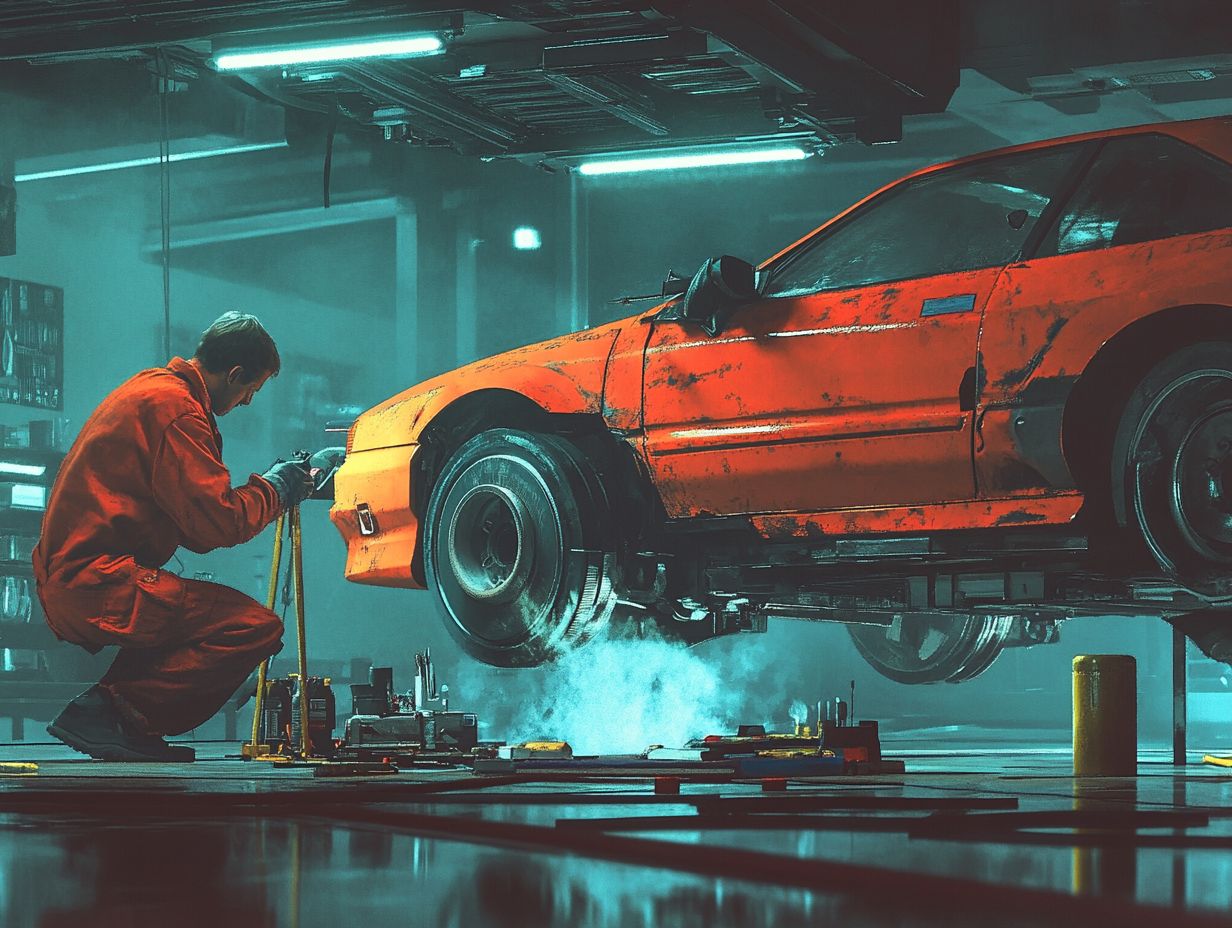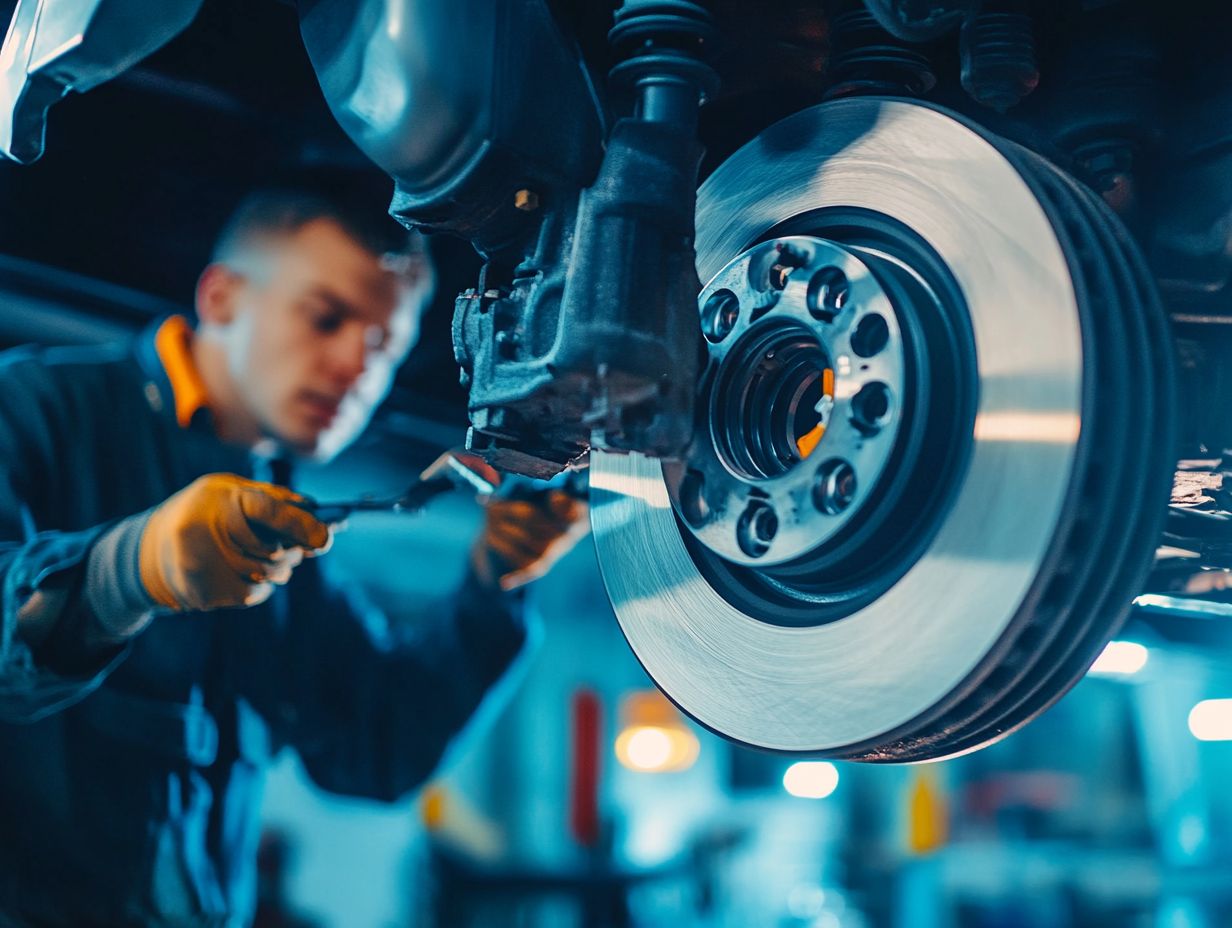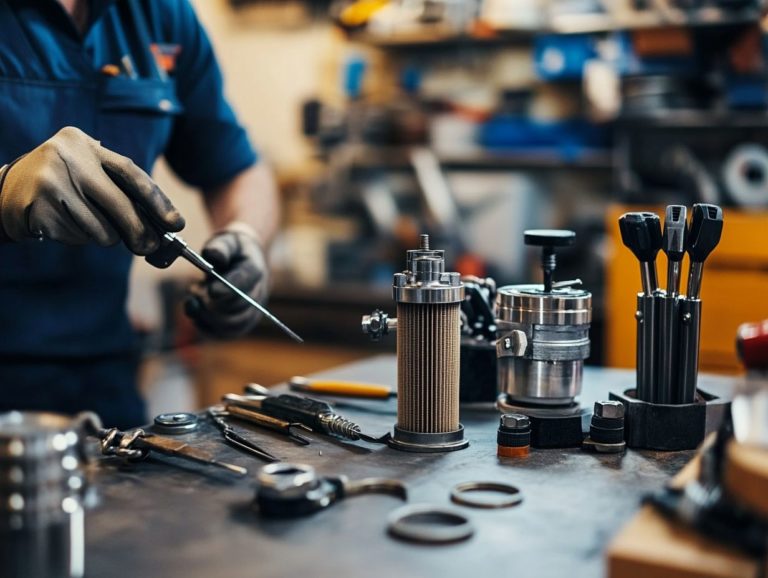Recognizing Common Brake Issues Early
In the realm of vehicle safety, your brakes serve as your first line of defense. Recognizing the signs of brake issues is vital for your safety and the longevity of your vehicle.
This article delves into the unmistakable signs that suggest your brakes might be in trouble, such as unusual noises and shifts in performance. You’ll also discover common causes of brake problems, preventative tips, and key factors to weigh when deciding whether to repair or replace.
Stay informed to ensure your drives remain safe and smooth!
Contents
Key Takeaways:

- Regularly inspect your brakes for unusual noises and vibrations, as well as changes in braking performance, to catch potential issues early.
- Worn brake pads and rotors, along with leaking brake fluid, are common causes of brake issues that should be addressed promptly to ensure safe driving.
- Prevent brake issues by scheduling regular maintenance and inspections. Know the difference between repair and replacement options when addressing any problems that arise.
Why Early Detection is Important
Early detection of brake issues is essential for ensuring your vehicle’s safety and performance. Worn brake pads and other components can diminish your stopping power, posing a risk of accidents.
By conducting regular inspections and keeping an eye out for warning signs like that annoying squeaking noise or a spongy pedal you can prevent costly repairs and maintain optimal brake functionality. This is crucial for enabling you to respond effectively in emergencies.
If you notice brake fluid leaking or the brake warning light coming on, don’t wait seek immediate help from a qualified mechanic. Addressing these issues promptly can prevent them from escalating into serious brake malfunctions or system failures.
Signs of Brake Issues
Identifying early signs of brake issues is crucial for enhancing both your vehicle’s safety and performance, allowing you to react swiftly to any irregularities. Look out for common warning signs, such as unusual brake sounds think squeaking or grinding and fluctuations in brake fluid levels, which may signal potential problems.
By monitoring these indicators, you not only maintain effective braking control but also extend the lifespan of critical brake components, leading to improved brake efficiency and performance.
Unusual Noises and Vibrations
Unusual noises and vibrations when you apply the brake can serve as telltale signs of underlying issues that demand immediate attention from a qualified mechanic. A persistent squeaking noise often points to worn brake pads, while grinding sounds may indicate severe wear or damage to the brake rotors.
If you feel unexpected vibrations during braking, it might signal problems with the brakes. Any of these issues can compromise both brake performance and your safety on the road.
These concerning sounds and sensations not only highlight potential mechanical failures but also pose serious risks to your vehicle’s overall safety. Ignoring a grinding sound could lead to further damage, ultimately increasing repair costs and jeopardizing your braking system’s effectiveness.
Regular assessments of your brake components are essential to ensure they function properly, providing safe stopping power when you need it most. By prioritizing timely inspections and servicing, you can maintain optimal brake condition, significantly reducing the likelihood of brake failure and enhancing your peace of mind while driving.
If you notice any of these signs, act quickly! Regularly inspecting your brakes can save you from dangerous situations and costly repairs.
Changes in Braking Performance

Changes in braking performance may manifest as a spongy pedal or diminished stopping power, signaling an urgent need for brake inspection. If you notice the brake pedal feeling soft or sinking to the floor, it may indicate a brake fluid leak or air trapped in the brake system.
If your vehicle pulls to one side while braking, this often points to uneven brake wear or potential caliper issues. Recognizing these changes early on can significantly reduce the risk of severe brake malfunction and enhance your overall brake safety.
Grinding noises during braking or vibrations felt through the steering wheel are also red flags, suggesting worn brake pads or damaged rotors. These symptoms necessitate prompt diagnostics to determine whether a simple pad replacement will do the trick or if a more extensive repair, such as repairing the surface of the rotors, is required.
Regular brake maintenance not only extends the lifespan of your braking components but also plays a crucial role in vehicle handling. This ensures a more confident and stable driving experience. Ignoring these warning signs may lead to increased stopping distances, ultimately putting your safety on the road at risk.
Common Causes of Brake Issues
Grasping the common causes of brake issues is vital for effective maintenance and ensuring your vehicle’s safety. Worn brake pads frequently take center stage in brake-related concerns. They directly influence stopping power and can lead to complications like warped rotors or brake fluid leaks.
Factors such as the quality of brake technology and the importance of regular servicing are crucial in maintaining brake efficiency and preventing premature failures. Prioritizing these elements can significantly enhance your driving experience and peace of mind on the road.
Worn Brake Pads and Rotors
Worn brake pads and rotors are among the top culprits affecting your vehicle’s brake performance. They directly impact its stopping ability and your safety. As brake pads wear down, they lose the necessary friction, leading to weaker braking and potentially damaging the rotors.
Regular checks and timely replacements of these critical components are essential. They help prevent serious performance issues and enhance your overall vehicle safety.
Neglecting brake servicing jeopardizes your safety. It can also lead to costly repairs in the future. When the pads become too thin, the metal backing can make contact with the rotors, causing scoring and warping that further deteriorate braking capability.
This cycle of damage highlights the importance of routine diagnostics and maintenance. It enables you to catch wear and tear before it escalates.
Investing in high-quality brake parts, including premium pads and rotors, can significantly improve longevity. This enhances your braking system’s performance, ensuring a smoother and safer driving experience.
Leaking Brake Fluid
A leaking brake fluid can seriously compromise the functionality of your vehicle’s hydraulic braking system, presenting significant safety risks. When your brake fluid levels drop due to a leak, the hydraulic pressure necessary for effective braking diminishes. This could lead to brake failure and potentially serious accidents.
You need to spot the signs of a brake fluid leak, such as a low brake fluid level or a brake warning light illuminating on your dashboard. Take immediate action for repair.
The implications go beyond the immediate threat of brake failure. Delaying may lead to higher repair costs and a decline in your vehicle s overall performance. It s essential to routinely monitor brake fluid levels and conduct thorough checks of your braking system. This ensures that even minor leaks are addressed before they escalate into larger issues.
Understanding the critical role brake fluid plays not only enhances your safety but also prolongs the life of your vehicle. This keeps it operating at peak performance and reduces the chances of unexpected malfunctions.
Preventing Brake Issues

Preventing brake issues is crucial for your vehicle’s safety. It all starts with a proactive approach to brake maintenance and regular inspections.
By establishing a routine brake maintenance schedule, you can identify potential problems like worn brake pads, warped rotors, and brake fluid leaks in a timely manner. This not only enhances brake performance but also reduces the risk of unexpected brake failures, keeping you secure on the road.
Regular Maintenance and Inspections
Regular maintenance and inspections of brake systems are essential for ensuring best performance and safety in your vehicle.
By prioritizing these checks, you can significantly extend the lifespan of vital components like brake discs, drums, and hoses. A thorough inspection typically involves checking brake fluid levels and ensuring the integrity of brake lines.
It’s also important to assess your brake pads for uneven wear. Overlooking these aspects can lead to costly repairs and potential safety risks.
Consistent evaluations help you make timely adjustments and replacements, safeguarding against unexpected failures. This enhances your overall driving experience through improved responsiveness and control.
Addressing Brake Issues
Addressing brake issues promptly is crucial for your vehicle’s safety. This often requires careful evaluation of whether to repair or replace various brake components.
Considerations such as the severity of the damage and cost implications should inform your decision-making process.
Consulting a qualified mechanic for comprehensive brake diagnostics offers invaluable insights into the best course of action whether that means a straightforward brake service or more extensive repairs.
Repair vs. Replacement Options
When you encounter brake issues, understanding the distinction between repair and replacement options for brake components is essential. Repairing worn brake pads or servicing the hydraulic system might suffice for minor problems, but significant damage to brake rotors or calipers often necessitates replacement.
A thorough evaluation by a professional mechanic can help you choose the best action to maintain optimal brake safety. Cost is typically a primary concern; repairs may offer a temporary solution at a lower expense, while replacements can enhance long-term safety.
Carefully assess the condition of the components. If brake parts show extensive wear or rust, replacement may be the safest route. By balancing these considerations with your vehicle’s usage and performance needs, you can make informed decisions that prioritize both functionality and peace of mind.
Frequently Asked Questions

What are the common brake problems I should be aware of?
Common brake problems include squeaking or grinding noises, a vibrating brake pedal, longer stopping distances, and a soft or spongy brake pedal.
Why is it important to recognize brake problems early?
Recognizing brake problems early can help prevent serious and expensive damage to your vehicle and ensure your safety on the road. To stay informed, learn about common signs of brake wear.
How can I tell if my brakes are wearing out?
Look for signs like low brake fluid, a warning light on your dashboard, or visible wear on your brake pads. You may also notice changes in braking performance.
What should I do if I notice brake problems?
Don t wait! Get your vehicle inspected by a professional mechanic as soon as possible to determine the cause and make necessary repairs.
Stay safe on the road! Schedule your brake inspection today!
Can I check my brakes myself?
You can easily check your brake pads and fluid level at home. However, it s best to let a professional mechanic look at your brakes for a complete assessment and any necessary repairs.
How often should I have my brakes checked?
Check your brakes at least once a year. If you notice any problems, or if you often drive in heavy traffic, get them checked more often!






